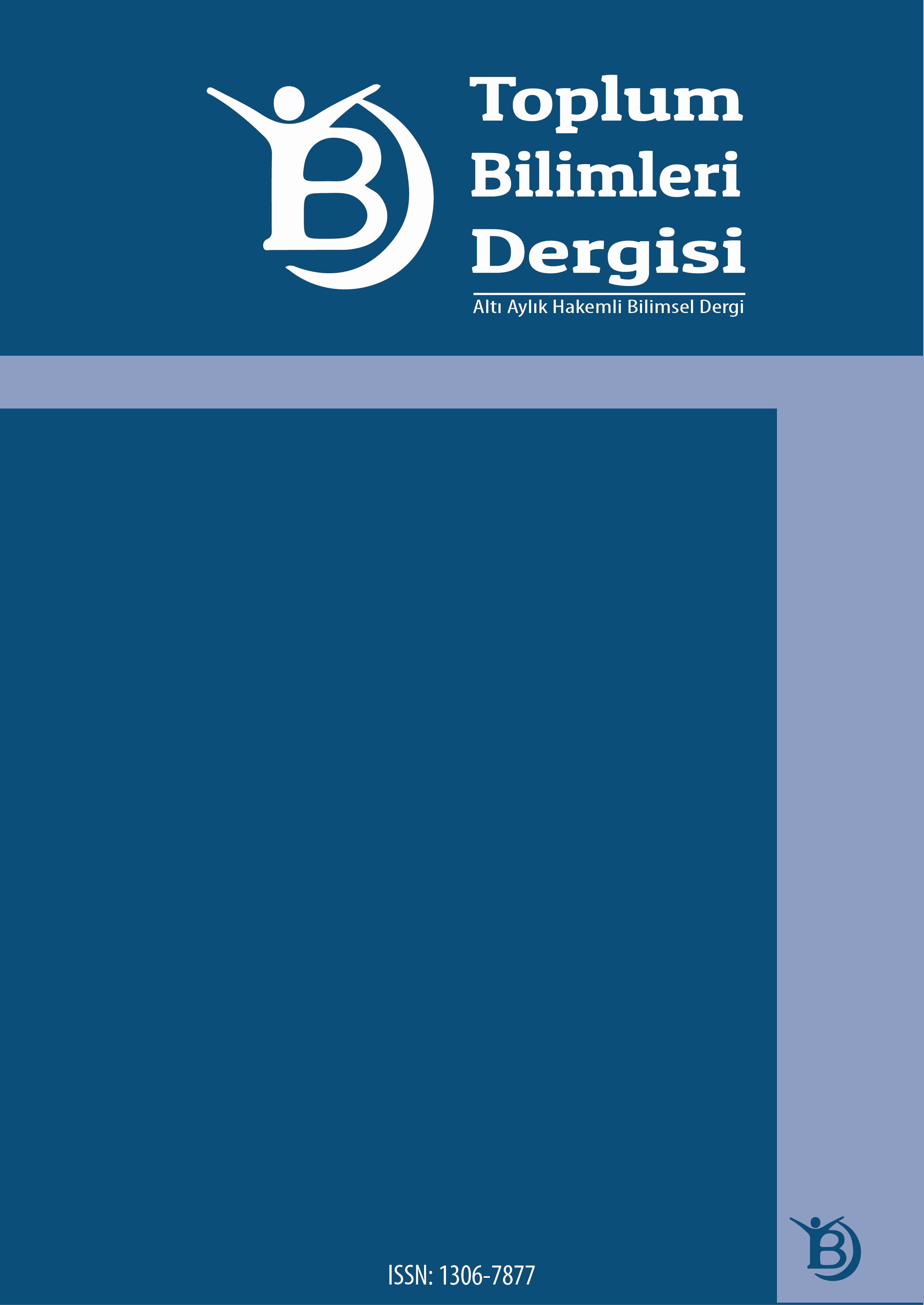Author :
Abstract
Günümüzde özellikle değişim olgusunun kaçınılmazlığı bilgi ve teknoloji alanlarından günlük yaşamın birçok alanında görülmektedir. Bireyin ise bu durumu nasıl algıladığı ve değişime karşı arzu ya da direnç göstermesinin psikolojik yönü öne çıkmaktadır. Değişimin en önemli direnç kaynağının psikolojik özellik gösterdiği birçok çalışmada ortaya koyulmuş ve psikolojik direncin nedenleri şöyle sıralanmıştır: belirsizlik ve bilgi eksikliği, yabancılaşma, değişimin kaynağı, alışkanlıklar, güvensizlik, ilgisizlik, peşin hüküm, algılama biçimi, kişisel düşmanlık, değişimin yanlış olduğu inancı, farklı değerlendirmeler ve hedefler, empoze edilen değişimden memnuniyetsizlik, değişimin getirdiği yeni kurallar ve kontrol artışına karşı duyulan kızgınlık. Bunlara ek olarak literatürde dinsel yönelimlerin de değişime direnç ya da arzu etme tutumlarını belirleyici etkilerinden söz edilmektedir. Bu çalışmada ise değişime direnç göstermenin psikolojisi bağlamında belirsizlik duygusu ve dinsel yönelimlerin etkileri birlikte ele alınacaktır
Keywords
Abstract
Especially today, the inevitability of change phenomenon is observed. in many areas of daily life and informaton and technology. It is featured that how the individual perceive this situaton and psychological aspect of the desire or resistance to change. A lot of study has revealed that the most important source of resistance to change shows psychological feature and the reasons of psychological resistance are listed as follows: Uncertainty and lack of informaton, the alienaton, the source of change, habits, distrust, indifference, prejudice, percepton of personal hostlity, false the belief that change, the different assessments and targets imposed change from discontent, heard against the new rules and control the increase brought about by changes in anger. Also in the literature it is mentoned about the decisive effects of religious orientaton on attudes of desire or resistance to change. In this study, a sense of uncertainty and the effects of religious orientatons will be examined together in the context of the psychology of the resistance to change.
Keywords
- Arslan, M. (2001). “Örgüt Kültürü”, (Ed. Salih Güney), Yönetim ve Organizasyon içinde, ss.177- 194, Ankara: Nobel Yayınları.
- Batson, C. D., SHOENRADE, P., & VENTIS, W. L. (1993). Religion and the Individual: A Social- Psychological Perspective. New York: Oxford University Press.
- Budak, Gülay & BUDAK, Gönül (2006). “Kriz ve Kriz Yönetimi”, (Ed. M. Şerif Şimşek, Said Kıngır), Çağdaş Yönetim Araçlarından Seçmeler içinde, ss.225-237, Ankara: Nobel Yay.
- Burger, J. M. (2006). Kişilik, Psikoloji Bilimin İnsan Doğasına Dair Söyledikleri. İstanbul: Kaknüs Yay.
- Conway, L. G.; Schaller, M.; Tweed, R. G., & Hallett, D. (2001). The Complexity of Thinking Across Cultures: Interactions Between Culture and Situational Context, Social Cognition, 19:3, ss. 228-250.
- Daş, C. (2006). Bütünleşmek ve Büyümek, Gestalt Terapi Yaklaşımı. Ankara: Hyb Yayıncılık - See more at: http://www.terapiportali.com/?page=blogpost&yid=92&url=direncin-terapide-ele-alinisi#sthash.0JqN0lao.OCvyu586.dpuf (erişim tarihi: 28.08.2015).
- Durna, U. (2002). Yenilik Yönetimi, Ankara: Nobel Yayınları.
- Gürses, İ. (2005). Önyargının Nedenleri. Uludağ Üniversitesi İlâhiyat Fakültesi Dergisi 14: 1, ss. 143-160.
- Hunsberger, B., Pratt, M., & Pancer, S. M. (1994). Religious fundamentalism and integrative complexity of thought: A relationship for existential content only? Journal for the Scientific Study of Religion, 33, 335-346.
- İnceoğlu, M. (2010). Tutum Algı İletişim. 5. Baskı, İstanbul: Beykent Üniversitesi Yayınları, No. 69.
- Kağıtçıbaşı, Ç. (1999). Yeni İnsan ve İnsanlar. İstanbul: Evrim Yay.
- Köse, A. & Ayten, A. (2010). Türbeler, Popüler Dindarlığın Durakları. İstanbul: Timaş Yay.
- Muluk, H. & Sumaktoyo, N. G. (2010). Intratextual Fundamentalism and the Desire for Simple Cognitive Structure: The Moderating Effect of the Ability to Achieve Cognitive Structure, Archive for the Psychology of Religion, 32: 217-238.
- Pahcen, S.M., JacksonN, L.M., Hunsberger, B., Pratt, M.W. & Lea, J. (1995). Religious orthodoxy and complexity of thought about religious and non-religious issues. Journal of Personality, 63, 213-232.
- Saroglou, V. (2002). Beyond dogmatism: The need for closure as related to religion. Mental Health, Religion, and Culture, 5, 183-194
- Stoner, J. A. F.& Wankel, C. (1986). Management, Third Edition, Prentice Hall International Edition, New Jersey, Printed in the United States of America.
- Şahin, A. (2011). “Değişim Yönetimi ve Yenilikçilik”, (Ed. Tuncay T. Turaboğlu), İşletmecilikte Güncel Konular içinde, s.305-330, Bursa: Ekin Yayınları.
- Terbaş, Ö. (2005). Joseph K.`nin Direnci. İmago Dergisi. - See more at: http://www.terapipor- tali.com/?page=blogpost&yid=92&url=direncin-terapide-ele-alinisi#sthash.0JqN0lao. OCvyu586.dpuf (erişim tarihi: 28.08.2015). Tunçer, P. (2013). Değişim Yönetimi Sürecinde Değişime Direnme. Ondokuz Mayıs Üniversitesi Eğitim Fakültesi Dergisi, 32(1), 373-406.
- Yapıcı, A. (2004). Din Kimlik ve Önyargı -Biz ve Onlar. Adana: Karahan Kitabevi.
- http://www.e-psikiyatri.com/degisimden-mi-korkuyor-sunuz-29218 (erişim tarihi: 28.08.2015).
- http://www.terapiportali.com/?page=blogpost&yid=92&url=direncin-terapide-ele- alinisi#sthash.0JqN0lao.dpuf (erişim tarihi: 28.08.2015).
